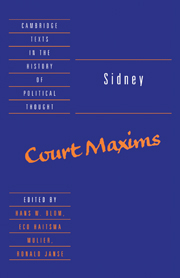Book contents
- Frontmatter
- Contents
- Preface
- Note on the text
- Introduction
- Principal events in Sidney's life
- Bibliographical note
- Biographical notes
- Court Maxims
- First Dialogue
- Second Dialogue
- Third Dialogue
- Fourth Dialogue
- Fifth Dialogue
- Sixth Dialogue
- Seventh Dialogue
- Eighth Dialogue
- Ninth Dialogue
- Tenth Dialogue
- Eleventh Dialogue
- Twelfth Dialogue
- Thirteenth Dialogue
- Fourteenth Dialogue
- Fifteenth Dialogue
- Index of biblical quotations
- Index of proper names
- Index of subjects
- Cambridge Texts in the History of Political Thought
Thirteenth Dialogue
Published online by Cambridge University Press: 05 June 2012
- Frontmatter
- Contents
- Preface
- Note on the text
- Introduction
- Principal events in Sidney's life
- Bibliographical note
- Biographical notes
- Court Maxims
- First Dialogue
- Second Dialogue
- Third Dialogue
- Fourth Dialogue
- Fifth Dialogue
- Sixth Dialogue
- Seventh Dialogue
- Eighth Dialogue
- Ninth Dialogue
- Tenth Dialogue
- Eleventh Dialogue
- Twelfth Dialogue
- Thirteenth Dialogue
- Fourteenth Dialogue
- Fifteenth Dialogue
- Index of biblical quotations
- Index of proper names
- Index of subjects
- Cambridge Texts in the History of Political Thought
Summary
Twelfth Court Maxim: Spain, Germany, Italy, and the catholic Princes are nothing to our court
Philalethes: in our last conference we discussed, as far as was requisite, the maxims and interests of our court, as they related to France and the United Provinces. It is hardly worth our pains to consider how the king and his ministers stand affected to other states, being little important to us. We only shall make use of them as occasion is offered. We look on Spain as decaying, fear it not, and hope for nothing but money to our chief ministers, that we may do them no hurt on Portugal's side. Denmark is our friend, but cannot help us. Sweden, we suspect, is ill-affected to us, but cannot hurt us. The princes of Germany are considerable only to such as attempt something in their country, which is far from our thoughts. We know the king, by interesting himself for the businesses of that country, might gain advantages to the nation, and easily unite all the Protestants of the world into one body and make himself their head. And that great | and good work might be a foundation for effecting others, pleasing to God and man. But for the attaining *of* such ends, we must have a frugal court, justice must be administered, men of virtue and valour advanced and employed, military discipline restored to subjects; and then we, who by our court get money enough to live in the height of splendour and pleasure, must apply ourselves to such as are very contrary to our complexion, requiring much sweat and blood.
- Type
- Chapter
- Information
- Sidney: Court Maxims , pp. 177 - 182Publisher: Cambridge University PressPrint publication year: 1996



